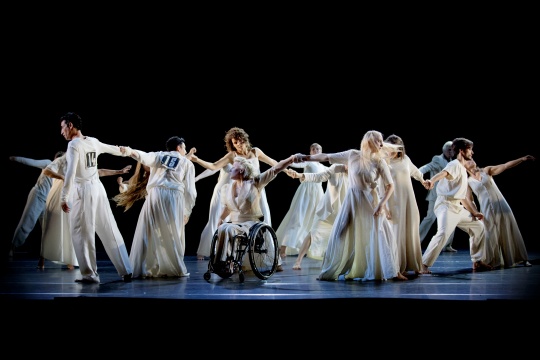Date: November 20, 2020 - November 20, 2020
Location: Sweden

The conference will be livestreamed on the 20 November at 09.30-16.00 CET
Please email dansfunk@skanesdansteater.se to enrol.
This day will be held in English with Swedish sign language.
In 2012, Skånes Dansteater started an internal journey towards a more inclusive dance scene with the festival DANSFUNK. The festival was to become a pivotal moment also nationally for a wider discussion around
the question of “Who does the stage belong to?”. The focus of the festival in 2012 was to challenge preconceived ideas about which bodies and identities belong to the stage. We scrutinized existing structures and future possibilities. Many great initiatives have happened since then and
several strategies set in place towards a greater inclusion within dance. On the 20th of November 2020 we would like to gather the dance industry once again with the aim of joining forces and begin the journey towards creating a manifest for the future.
For this work we need the voices and experiences of everyone – choreographers, dancers, policymakers, producers, dance development officers to name a few.
PROGRAMME
Manifesto for an inclusive performing art: Focus Dance
Together with other leading dance organisations working with inclusive dance, Skånes Dansteater and Share Music & Performing Arts are inviting you to take part in debates and discussions about national cultural strategies, policies and frameworks that need to be developed in order for a more inclusive dance scene. Accessibility to dance is not about reducing physical discriminatory barriers but rather an artistic endeavour to develop dance as an artform. Where are we now and what formal cultural policies and structures needs to be implemented for the future? We will look at the current national status report but also examples from other countries such as the Netherlands, Italy and UK.
Participants: Ingrid Skare – Swedish Arts Council, Holland Dance Festival & LKCA, Oriente Occidente, Abid Hussain – Director of Diversity Arts Council of England. Moderator: Sophia Alexandersson – chief executive/artistic director Share Music & Performing Arts.
Who dictates the conditions for artists?
How do we challenge the structures and processes that exists when we produce and make dance? Are these structures different within institutions, independent dance companies and the freelance sector? How do we challenge our ways of working so that it is the artists themselves setting the
conditions of working? How do we create possibilities so that disabled choreographers and dancers develop artistic leadership on their own terms?
Participants: Kate Marsh – dancer, choreographer and researcher. Madeleine Månsson – dancer/ choreographer Skånes Dansteater, Sindri Runudde – independent dancer/choreographer, Emilia Wärff – dancer Danskompaniet Spinn. Moderator: Stine Nilsen – Artistic Director and CEO at CODA Oslo International Dance Festival
An evolving dance education
Disabled dancers and choreographers do often not take the same pathways to the dance profession as others. Often this is not something that they have chosen themselves but rather a consequence of the fact that traditional routes into the profession are not available to them. This became clear
during DansFunk 2012. Since then a lot has changed but still discriminatory barriers to dance education exits. In this session we will look at how dance education has evolved for disabled dance students, from early education through to university.
Participants: Annika Notér Hooshidar – University Lecturer at Uniarts in Stockholm, Karin Delén – dancer Share Music & Performing Arts and solicitor, Beata Alving – Head of the Cultural school in Sigtuna, Laura Jones – Head of Talent Development at Stop Gap Dance Company. Moderator
Petra Frank, Head of Department, Academy of Music and Drama at University of Gothenburg
Programming and curating dance
The Swedish Arts Council actively works towards developing structural policies and frameworks so that disabled people have equal access to the arts and culture as audiences, participants and as artists. This mission stems from the UN Convention on Human Rights which declares that it is the full obligation of State members to deliver full accessibility to and participation in, all aspects of culture.
How does this work manifest itself within Swedish dance programmers, dance producers, dance houses and other venues that present dance performances? How can we, using the support of the signed UN convention, develop a sustainable agenda which enables our audiences to gain access to
performances by and with disabled dancers and choreographers.
Participants: Veera Suvalo Grimberg – Artistic Director Danskompaniet Spinn, Dag Rosenqvist – Producentbyrån, Raphaële Choppin – Cultural Officer at Arts Council of Sweden, Nadja Dias – Executive Producer Claire Cunningham & Independent Senior Producer. Moderator: Ingrid Fransson,
Head of Production and Planning at Malmö Opera
Impact of Dansfunk 2020
On the day, 1700 people followed the conference, with 90% of the audience staying for at least 4.5 hours out of a 6-hour day. 450 people stayed for the entire day, with many expressing an interest in continuing these conversations around dance and disability and helping to support the changes needed within the arts.